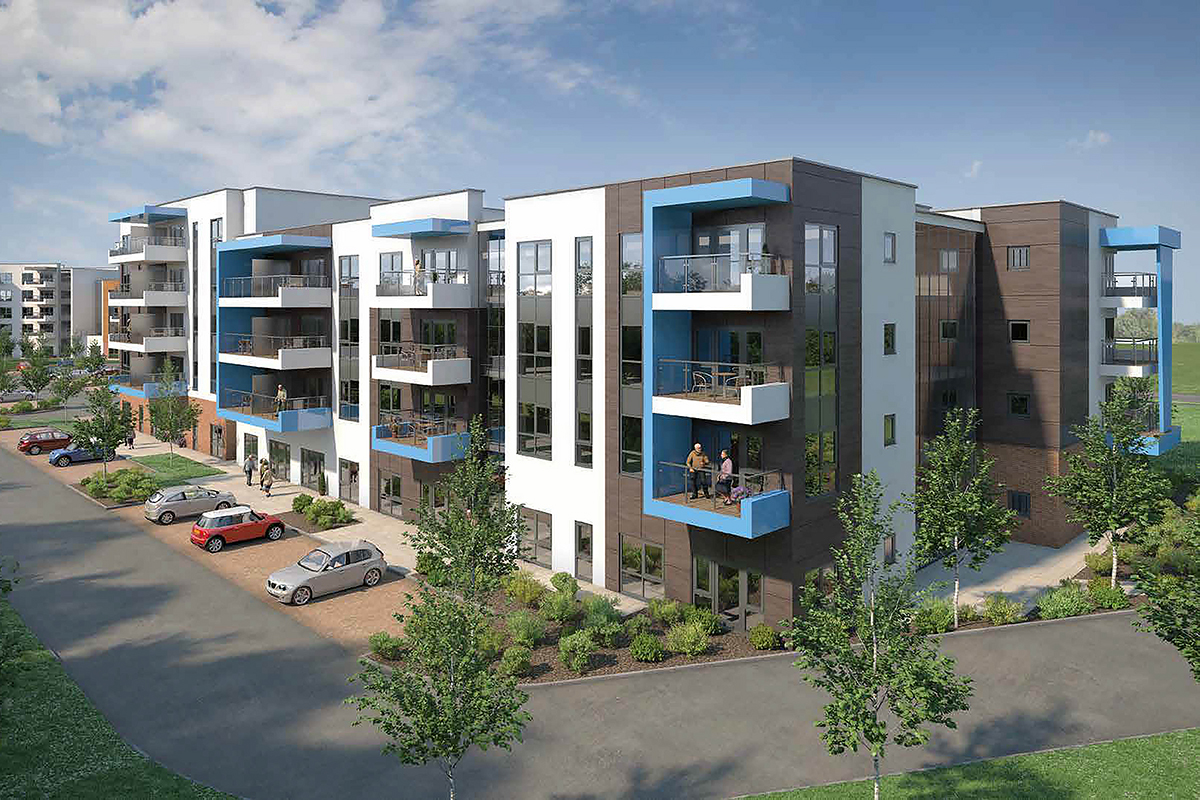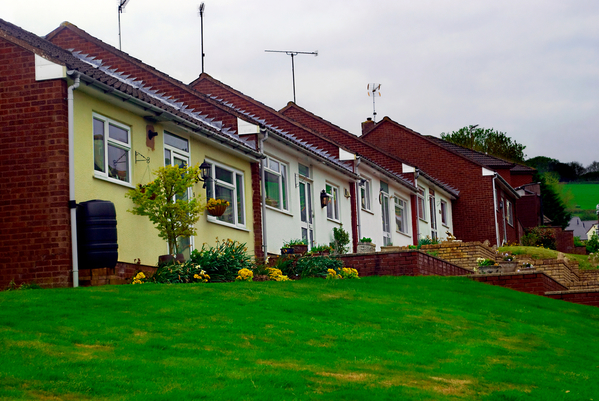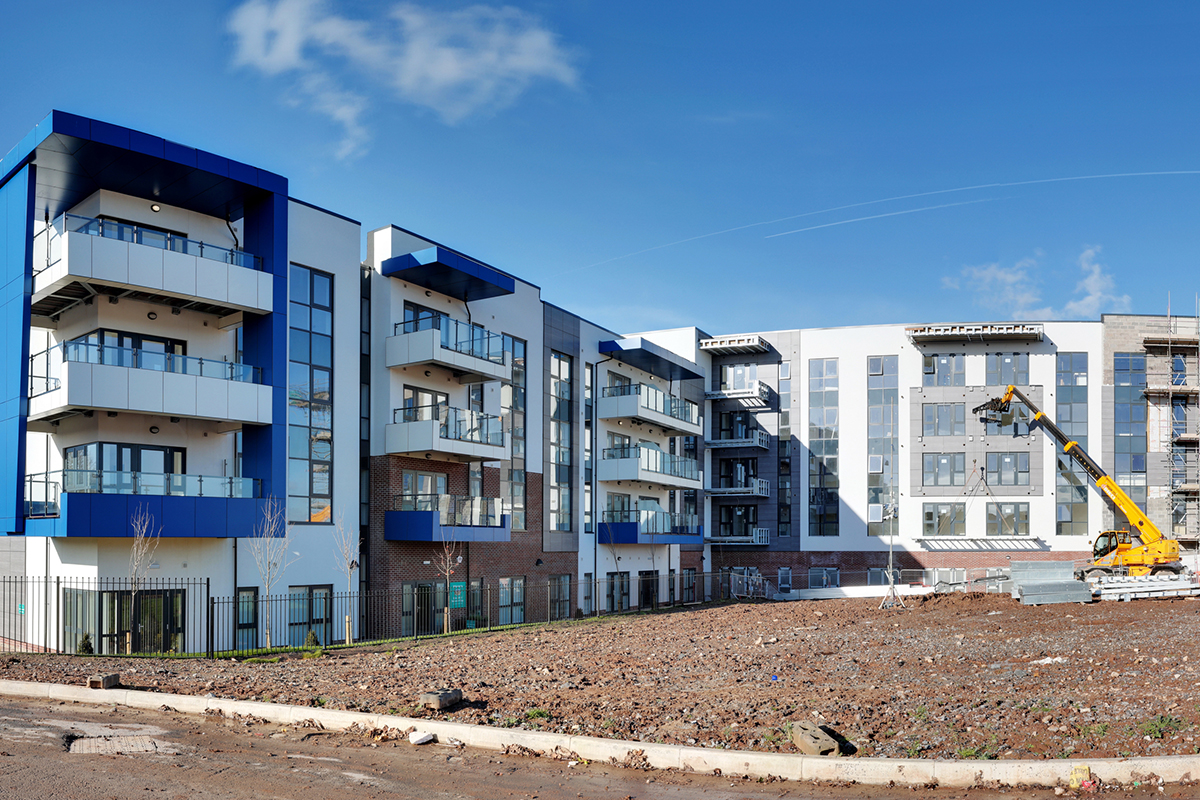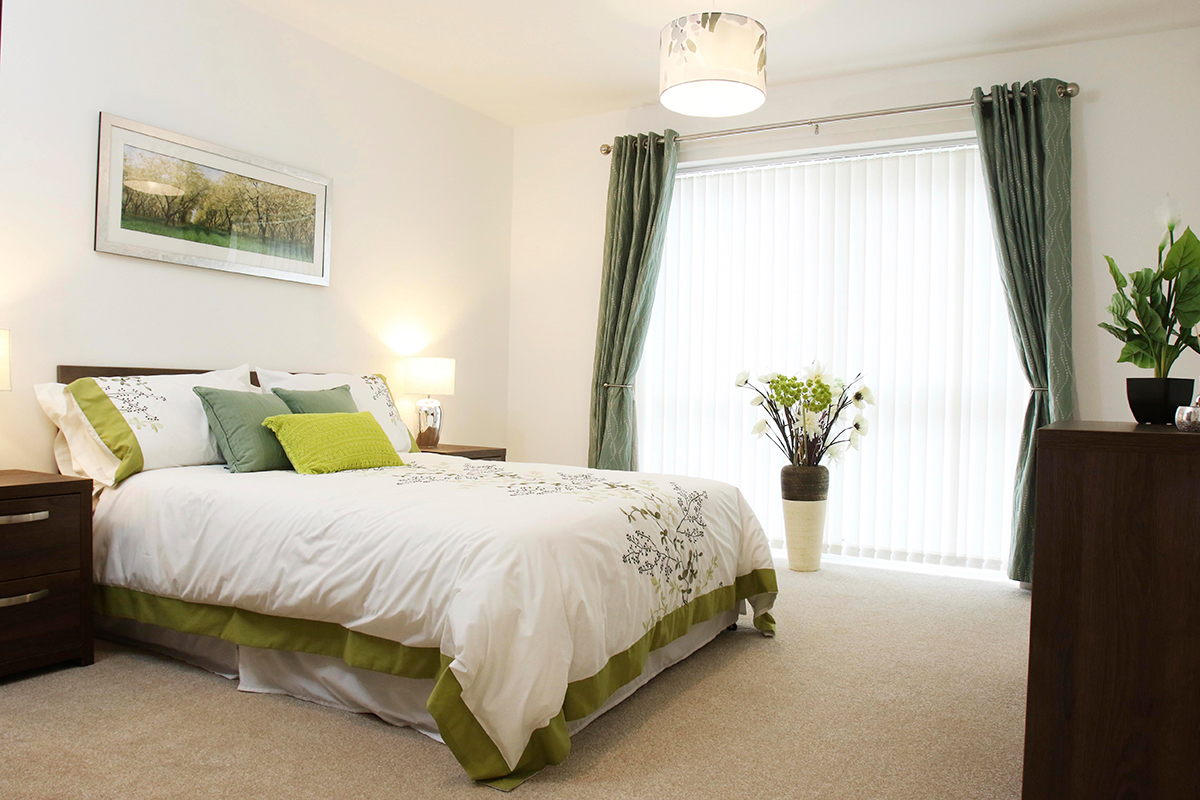You are viewing 1 of your 1 free articles
How to encourage downsizing
Enabling older people to downsize can improve their well-being while freeing up scarce family housing. Alex Turner reports from Bristol on how one provider is putting that process into action. Pictures by ExtraCare Charitable Trust
On the morning of Inside Housing’s visit, the Stoke Gifford Retirement Village feels neither immediately enticing nor particularly accessible.
The five-storey flat complex under construction off a roundabout on the edge of Bristol is surrounded by construction grit and grime, which swirls in the breeze. To gain entry, we trek through the arid landscape via a maze of colour-coordinated gates, eventually arriving in a spotless but deserted reception area.
However first impressions can be deceptive. The 261-home village, being developed by 3,800-home specialist provider the ExtraCare Charitable Trust, is designed to reduce some of the obstacles to moving house that older people face. We’ve come here as work nears completion to find out more about that process.
Research published in 2012 by the Joseph Rowntree Foundation (JRF) found 93% of over-55s in England live in ‘mainstream’ housing of one tenure or another. The study established that just 3% of the 7.3 million households containing no one under 55 move each year. Rather grimly, it also found that 85% of homes with three or more bedrooms are “released by older people due to death rather than a move to a smaller home”.
Staying put can leave people growing old in unsuitable accommodation, restricting quality of life and in some cases contributing to poor mental and physical health. While the scale of its impact is debated, there is also the knock-on effect, suffered by both the private and social housing sectors, of family homes being under-occupied by older people, so they are not available for households who could use extra space.
Yet for many, the barriers to relocating remain considerable. They include costs associated with moving, a shortage of properties that meet needs and aspirations, and the stress of uprooting from familiar surroundings after decades.
A February report by the Communities and Local Government Select Committee (CLG), which raked over these issues in detail, called for a national strategy on the housing needs of older people to be developed.
Among a series of recommendations, the report suggested expanding the options for older social tenants and owner-occupiers of lower-value properties, including by increasing the role shared ownership can play.
Clive Betts, chair of the CLG committee, added that it was “vital” the link between housing and health and social care was recognised – a point the government responded to in September when it highlighted that “housing will form a part of our considerations” in the delayed Social Care Green Paper due this autumn.
These are all issues we’ve come to discuss at Stoke Gifford, where the new village aims to provide a ready-made community for residents to plug into, as well as access to flexible care, including for people with dementia.
“Residents are investing in their future, and by [coming here] can also help the overall housing situation by releasing family homes,” says Lesley Blowers, commissioning manager at ExtraCare.
CGI of the village reception area
The Stoke Gifford village includes 62 homes for leasehold sale, at prices of up to almost £500,000, more than half of which have been reserved at press time. But it also incorporates 81 at affordable rents, to be split 41/40 for allocation to South Gloucestershire and Bristol councils, and 118 for shared ownership, starting at £139,000.
Leasehold or shared ownership sale prices must be met in full from the proceeds of selling previous homes, given the difficulty older people experience obtaining a mortgage.
ExtraCare’s website states: “Living with [us] should be affordable for all, including [people] living in a rental home with only a minimum state pension.”
Making such commitments work takes careful means testing, explains Susan Hiroli, sales co-ordinator at ExtraCare, who with her colleague Andy Sleight, another sales co-ordinator, escorts us through an airy atrium, open to the sky which forms one residential wing of the village.
“If we give away 50% ownership to people who can afford much more, people with less won’t be able to move in,” says Ms Hiroli. “What’s great is when you find someone who doesn’t have a lot of money – say they have a property worth £160,000, they put in £140,000 and can live here from about £49 a week, all in.”
The latter figure, again dependent on income and savings, covers weekly charges for maintenance, utilities and miscellaneous costs, which include activities and an on-site well-being service. An in-house benefits advisor assesses prospective residents to establish what they may be eligible for, says Mr Sleight, adding that “we don’t want to move them in using their last beans, then have them living off lettuce and water”.
People who come in from council nominations must – unlike private residents – already have an assessed social care need, with downsizing not specifically factored into their priority status. The site is geared to deliver high-level support, though it is anticipated that its purpose-built nature could actually enable some packages to be reduced slightly.
“Isolation and loneliness are significant issues for older people, where family have moved away and partners have passed away or are unable to maintain a property,” says a spokesperson for South Gloucestershire Council.
Technological assistance
Stoke Gifford Retirement Village under construction
The opening of the ExtraCare Charitable Trust’s scheme at Stoke Gifford will mark the start of a two-year collaboration between the housing provider and the University of the West of England (UWE).
New assistive technologies for older people – for instance, using Amazon’s voice-activated assistant, Alexa – have been in vogue of late within the care sector as providers look to reduce intrusive staffing and work more efficiently.
But fears have also been raised that such moves may be made with an eye on the bottom line, as well as because of their benefits to recipients. The Stoke Gifford project’s focus – in line with the scheme’s ethos – will be on how technology can be socially, as well as physically, beneficial to residents.
“Technology can give us early indicators of when someone’s age-related condition starts affecting their social life,” explains Dr Praminda Caleb-Solly, an associate professor of independent living systems at UWE, who is the project’s academic lead.
“But we also want to be creative about how we use the technology,” she adds. “It could be about integrating bespoke social media tools so people can find like-minded companions to spend time with.”
Using assistive technology ethically is a key concern of UWE’s robotics lab, Dr Caleb-Solly goes on. “From our point of view, it should be first and foremost [used] for a person to be able to self-manage, rather than being used as a monitoring tool.”
At the retirement village, a graduate trainee will work closely with both residents and carers to understand their needs, and to trial different technologies.
“One really important thing is that we want residents to try things and tell us what works – and support their peers to do so, because they’re the ones best able to relate to them,” says Dr Caleb-Solly.
“ExtraCare offers a valid solution, so care need eligibility is set at a low level, enabling individuals to access the service and enjoy a more inclusive lifestyle,” the spokesperson adds.
That inclusivity extends to the flats themselves – mostly two-beds – explains Ms Hiroli as we inspect a couple of finished properties. Social tenants get a slightly different kitchen and bathroom spec, but all homes are fully wheelchair accessible, with balconies or patios and features such as anti-slip flooring, cool-touch radiators and hallway-mounted tablet displays.
The latter incorporate assistive technology functions, set to evolve via a partnership with the University of the West of England (see box), plus the ability to communicate via email with the rest of the village.
Social aspects of life, explains Lesley Blowers, commissioning manager at ExtraCare, form a crucial selling point that has been developed via resident feedback, as its portfolio of villages expands – currently it has 16, including four in development.
Stoke Gifford will be the third such scheme to be fully “outward facing”, says Ms Blowers, meaning locals from the Taylor Wimpey estate being built next door – and beyond – can access its facilities. These include restaurants, salons, a gym and, at a time when many nearby branches are under threat, a new public library operated by South Gloucestershire Council.
“It means it’s not just an old people’s home – you’ll get the grandkids in, some teenagers – it’s a better environment to meet their nana and grandad,” says Ms Blowers. Residents are also actively encouraged to form internal societies based on shared interests in order to forge community links – the list on ExtraCare’s website ranges from abseiling to choir singing.
Not far from Stoke Gifford, in Yate, a commuter town 12 miles from central Bristol, we meet 73-year-old Jean Fender and her husband Colin, 74, who are looking forward to getting stuck in.
“We have friends in their mid-80s who can’t drive any more and are lonely and isolated,” says Ms Fender, who explains the couple’s children do not live close by. “In this flat there will be things going on and staff are there if anyone needs help.”
Interiors of the village flats at Stoke Gifford
A tie-in between ExtraCare and a local estate agent has helped ease some of the logistical headaches around the Fenders’ move. They are also among a sizeable minority of prospective Stoke Gifford residents to have taken up ExtraCare’s offer of a visit to a recently completed village in Longbridge, Birmingham, which helped seal the deal.
“The flats are nice shapes and sizes, very liveable,” continues Ms Fender. “We spoke to others, asked, ‘Are you happy?’ and they said it was the best thing they’d ever done.”
The Fenders’ situation illustrates the advantages of offering shared ownership in schemes such as the one at Stoke Gifford. While they are selling a three-bed house – with a good-sized garden they now struggle with – they are sad to be leaving – prices in Yate are lower than Bristol, leaving them short of an outright purchase.
“Others we looked at we thought, ‘No, that’s too much’,” continues Ms Fender. “Stoke Gifford was appealing because of the shared ownership options.”
When the Fenders leave their home, a local family will move in – who Mr Fender says already have plans to create an extra room in the garage.
A single house is unlikely to cause a noticeable ripple in the frenzied waters of the housing market around Bristol. Still, the Fenders’ move fits into South Gloucestershire’s “strategic aim” to free up family housing of all tenures – something the council’s spokesperson says the Stoke Gifford village can have a “significant effect” on, without giving specific details.
For Bristol Council, the scheme represents a dent in the 980 units the authority hopes will be built in the city for older people over the next few years.
“We’re looking forward to what we can make of it,” says Mr Fender, who thanks to Google Maps has a clear perspective on the green spaces accessible from the site once the construction equipment has gone.
“I love my garden – we won’t have that but there’s no point hankering back,” Mr Fender continues.
“So long as we can keep fit – or our scooters can get up and down hills,” he concludes with a grin, “we’ll be taking new opportunities to get out and watch nature.”















